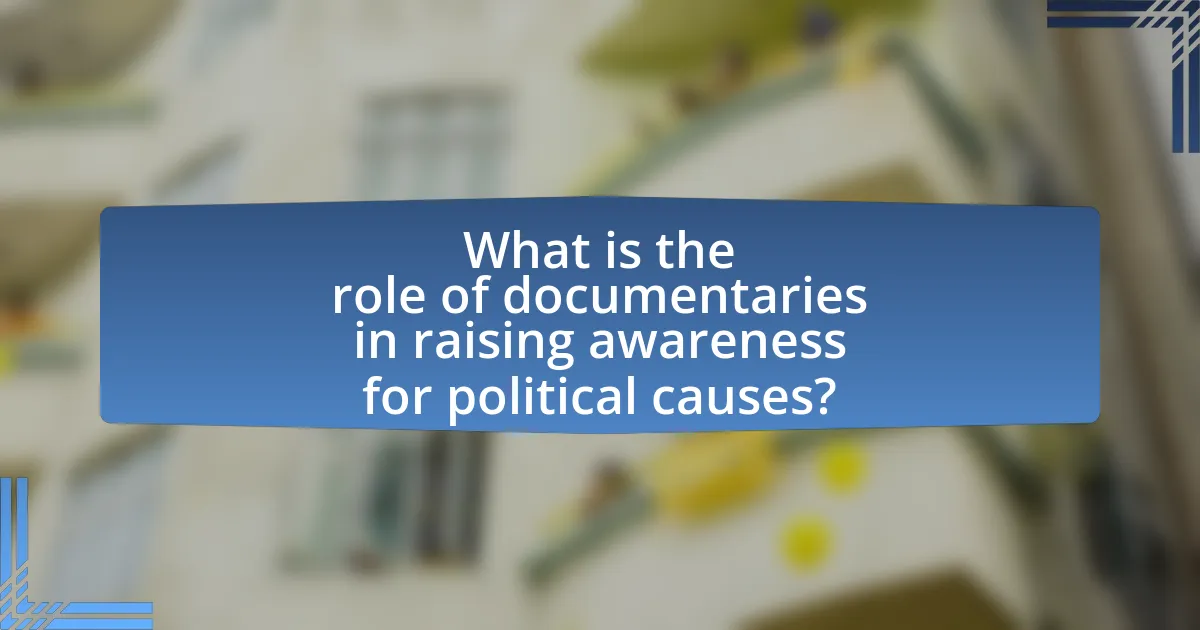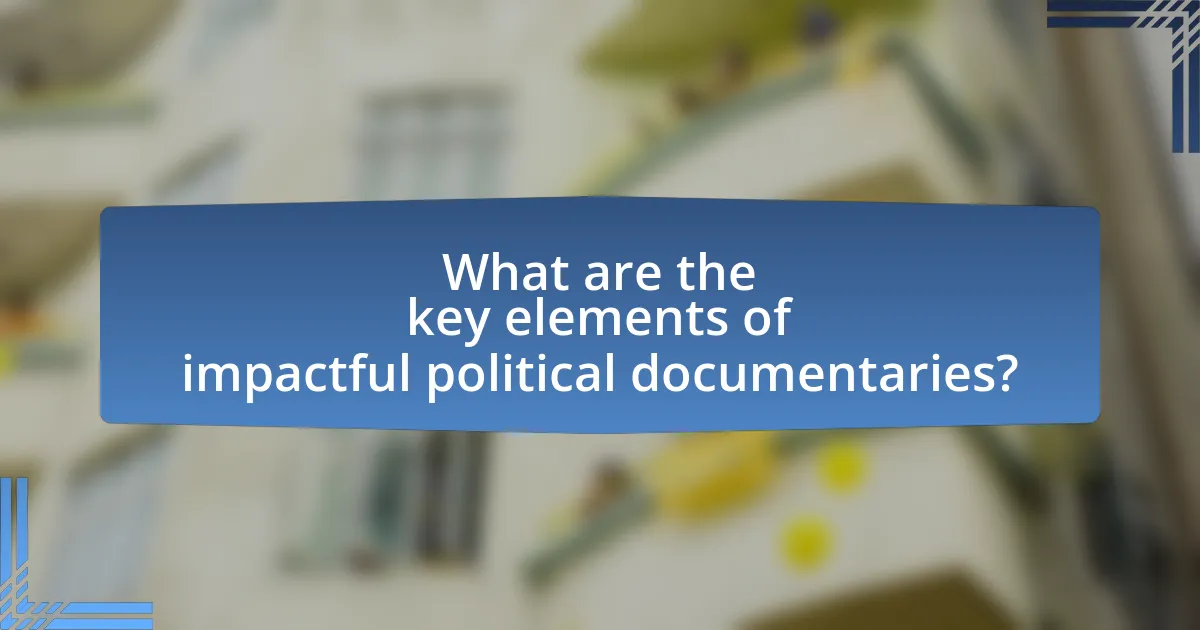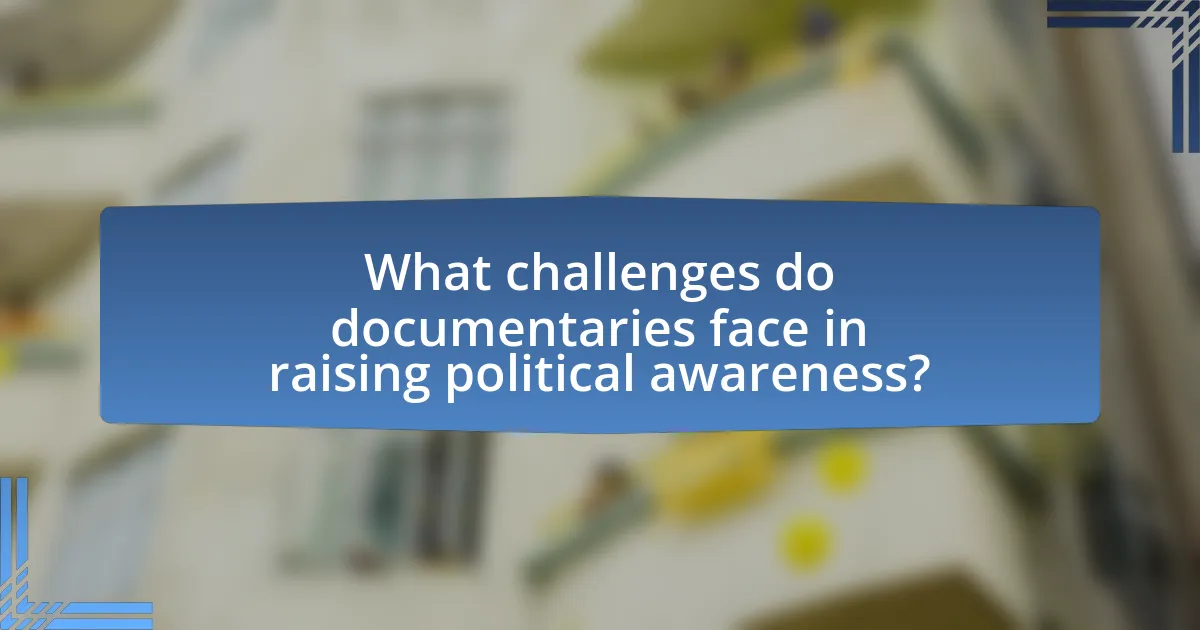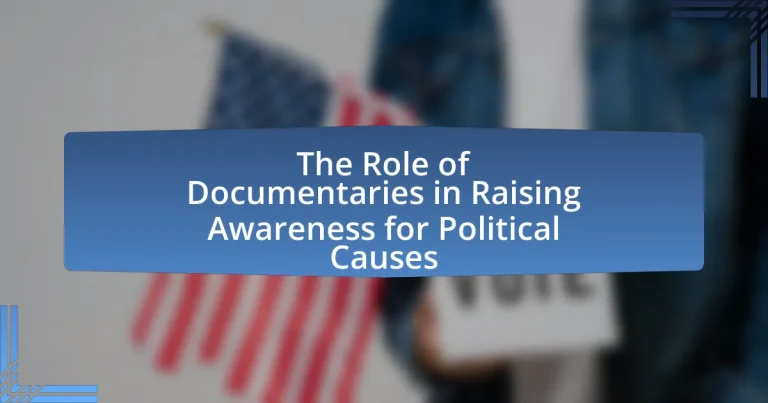Documentaries serve as vital tools for raising awareness about political causes by combining in-depth analysis with emotional storytelling. They highlight social injustices, human rights violations, and environmental issues, influencing public perception and inspiring activism. Key techniques employed by filmmakers include emotional narratives, visual symbolism, and expert interviews, which enhance viewer engagement and understanding. The article explores the impact of documentaries on political activism, the challenges they face in distribution, and the strategies filmmakers can use to effectively engage audiences and foster awareness. Additionally, it discusses the importance of historical context and the selection of relevant subjects in creating impactful political documentaries.

What is the role of documentaries in raising awareness for political causes?
Documentaries play a crucial role in raising awareness for political causes by providing in-depth analysis and visual storytelling that engages audiences emotionally and intellectually. They often highlight social injustices, human rights violations, and environmental issues, prompting viewers to reflect on these topics and consider their implications. For instance, the documentary “13th” by Ava DuVernay explores the intersection of race, justice, and mass incarceration in the United States, effectively raising awareness about systemic racism and its historical roots. Such films can influence public opinion, inspire activism, and even impact policy changes by presenting compelling evidence and personal narratives that resonate with viewers.
How do documentaries influence public perception of political issues?
Documentaries influence public perception of political issues by providing in-depth analysis and emotional narratives that shape viewers’ understanding and attitudes. Through storytelling, documentaries can highlight underrepresented perspectives, evoke empathy, and present factual evidence that challenges prevailing narratives. For instance, the documentary “13th” by Ava DuVernay explores the intersection of race, justice, and mass incarceration in the United States, leading to increased awareness and discussions about systemic racism and criminal justice reform. Research indicates that documentaries can significantly impact viewers’ opinions, as they often serve as a catalyst for social change by motivating audiences to engage with political issues more critically.
What techniques do filmmakers use to engage viewers with political content?
Filmmakers use techniques such as emotional storytelling, visual symbolism, and expert interviews to engage viewers with political content. Emotional storytelling captures the audience’s attention by presenting relatable characters and personal narratives that evoke empathy, as seen in documentaries like “13th,” which explores systemic racism in the U.S. Visual symbolism enhances the message by using powerful imagery to represent complex political issues, such as the use of the Berlin Wall in “The Fall of the Berlin Wall.” Expert interviews provide credibility and depth, allowing filmmakers to present informed perspectives, as demonstrated in “Inside Job,” which examines the 2008 financial crisis through insights from economists and industry insiders. These techniques effectively draw viewers into the political discourse and encourage critical reflection on societal issues.
How does storytelling in documentaries enhance political awareness?
Storytelling in documentaries enhances political awareness by presenting complex issues in a relatable and engaging manner. This narrative approach allows viewers to connect emotionally with the subject matter, making abstract political concepts more tangible. For instance, documentaries like “13th” by Ava DuVernay illustrate systemic racism and mass incarceration through personal stories and historical context, prompting viewers to reflect on these societal issues. Research indicates that emotional engagement through storytelling can lead to increased empathy and understanding, which are crucial for fostering political awareness and motivating civic action.
Why are documentaries considered effective tools for advocacy?
Documentaries are considered effective tools for advocacy because they provide compelling narratives that engage audiences emotionally and intellectually. By presenting real-life stories and factual information, documentaries can illuminate social issues, influence public opinion, and inspire action. For instance, the documentary “An Inconvenient Truth” significantly raised awareness about climate change, leading to increased public discourse and policy discussions. This effectiveness is further supported by research indicating that visual storytelling can enhance retention of information and motivate viewers to participate in advocacy efforts, as evidenced by studies from the University of California, which found that documentaries can lead to increased activism and support for causes presented.
What evidence supports the impact of documentaries on political activism?
Documentaries significantly impact political activism by raising awareness and mobilizing audiences. Research indicates that documentaries can increase viewers’ knowledge about social issues, leading to higher engagement in activism. For instance, a study published in the Journal of Communication found that viewers of the documentary “An Inconvenient Truth” reported increased concern about climate change and a greater likelihood of participating in related activism. Additionally, the National Endowment for the Arts reported that documentaries addressing social justice issues often lead to community discussions and actions, demonstrating their effectiveness in inspiring political engagement.
How do documentaries compare to other media forms in raising awareness?
Documentaries are more effective than other media forms in raising awareness due to their ability to present in-depth narratives and factual evidence. Unlike traditional news articles or social media posts, documentaries combine visual storytelling with comprehensive research, allowing viewers to engage emotionally and intellectually with the subject matter. For instance, a study by the University of Southern California found that documentaries can increase viewers’ understanding of complex social issues by 50% compared to other media formats. This immersive experience fosters empathy and encourages action, making documentaries a powerful tool for advocacy and social change.

What are the key elements of impactful political documentaries?
The key elements of impactful political documentaries include compelling storytelling, thorough research, emotional engagement, and a clear call to action. Compelling storytelling captivates the audience, often using personal narratives or case studies to illustrate broader political issues. Thorough research ensures the documentary presents accurate information, often supported by statistics or expert interviews, which enhances credibility. Emotional engagement connects viewers to the subject matter, making the political issues more relatable and urgent. A clear call to action motivates viewers to engage with the cause, whether through advocacy, education, or activism, thereby fostering a sense of responsibility and urgency. These elements work together to create a powerful medium for raising awareness about political causes.
What themes are commonly explored in political documentaries?
Political documentaries commonly explore themes such as social justice, government corruption, human rights violations, and environmental issues. These themes are prevalent as they aim to inform and engage audiences about critical societal challenges. For instance, documentaries like “13th” focus on racial inequality and mass incarceration, while “An Inconvenient Truth” addresses climate change, highlighting the urgency of environmental action. Such films often utilize real-life events, statistics, and expert interviews to substantiate their narratives, thereby reinforcing their impact on public awareness and discourse.
How do these themes resonate with audiences?
Themes in documentaries resonate with audiences by evoking emotional responses and fostering a sense of connection to political issues. For instance, documentaries often highlight personal stories and struggles, making complex political topics relatable and urgent. Research shows that emotional engagement significantly increases viewer retention and motivates action; a study by the University of California found that emotionally charged narratives can lead to a 50% increase in audience engagement compared to neutral presentations. This emotional resonance encourages viewers to reflect on their values and beliefs, ultimately driving awareness and advocacy for political causes.
What role does historical context play in political documentaries?
Historical context is crucial in political documentaries as it provides the background necessary for understanding the events and issues being presented. By situating political narratives within their historical framework, filmmakers can illustrate how past events shape current political landscapes and public perceptions. For instance, documentaries like “13th” by Ava DuVernay highlight the historical context of racial inequality in the United States, linking the legacy of slavery to contemporary mass incarceration. This connection not only informs viewers but also fosters a deeper understanding of ongoing social justice issues, demonstrating that historical context is essential for comprehending the complexities of political causes.
How do filmmakers choose their subjects for political documentaries?
Filmmakers choose their subjects for political documentaries based on relevance to current social issues, personal passion, and the potential for audience engagement. They often select topics that resonate with pressing political debates or injustices, aiming to highlight underrepresented voices or critical events. For instance, documentaries like “13th” by Ava DuVernay focus on systemic racism and mass incarceration, reflecting significant societal concerns. This approach not only informs viewers but also sparks dialogue and activism, demonstrating the filmmakers’ intent to raise awareness and inspire change.
What criteria are used to select impactful political issues?
Impactful political issues are selected based on criteria such as relevance, urgency, public interest, and potential for change. Relevance ensures that the issue resonates with current societal concerns, while urgency highlights the need for immediate action. Public interest gauges the level of engagement and awareness among the population, and potential for change assesses whether addressing the issue can lead to significant societal improvements. For example, issues like climate change and social justice have gained traction due to their widespread relevance and urgency, as evidenced by numerous documentaries that have successfully raised awareness and mobilized public action.
How does the choice of subject affect audience engagement?
The choice of subject significantly affects audience engagement by determining the relevance and emotional resonance of the content. When documentaries focus on timely and relatable political issues, they tend to attract more viewers and foster deeper connections, as evidenced by the success of films like “13th,” which addresses systemic racism and mass incarceration, leading to increased public discourse and activism. Research indicates that subjects that evoke strong emotional responses, such as injustice or human rights violations, can enhance viewer investment and encourage action, as shown in studies by the Pew Research Center, which highlight that emotionally charged content leads to higher engagement levels.

What challenges do documentaries face in raising political awareness?
Documentaries face several challenges in raising political awareness, primarily including audience engagement, bias perception, and distribution limitations. Audience engagement is critical, as many viewers may lack interest in political topics or prefer entertainment over informative content, leading to lower viewership and impact. Additionally, documentaries often confront bias perception; audiences may dismiss films as propaganda if they believe the filmmakers have a particular agenda, which can hinder the intended message. Distribution limitations also pose a significant challenge, as documentaries may struggle to reach wider audiences due to competition with mainstream media and limited funding for marketing. These factors collectively impede the effectiveness of documentaries in fostering political awareness.
What barriers exist in the distribution of political documentaries?
Barriers in the distribution of political documentaries include limited funding, censorship, and audience accessibility. Limited funding restricts production and marketing efforts, making it difficult for filmmakers to reach wider audiences. Censorship can arise from governmental or corporate entities that may suppress content deemed controversial or politically sensitive, thereby limiting distribution channels. Additionally, audience accessibility issues, such as lack of availability on mainstream platforms or geographical restrictions, hinder the ability of viewers to access these documentaries. For instance, a study by the International Documentary Association highlights that financial constraints and regulatory challenges significantly impact the distribution landscape for politically charged content.
How do funding and sponsorship influence documentary content?
Funding and sponsorship significantly influence documentary content by shaping the narrative, focus, and production values. Financial backers often have specific agendas or interests, which can lead to biased portrayals or selective storytelling that aligns with their objectives. For instance, a documentary funded by an environmental organization may emphasize climate change issues while downplaying opposing viewpoints. Research indicates that documentaries receiving corporate sponsorship may also prioritize topics that align with the sponsor’s brand image, potentially limiting the scope of critical discourse. This dynamic can affect the authenticity and objectivity of the documentary, as seen in cases where funding sources dictate the inclusion or exclusion of certain perspectives.
What role does censorship play in the production of political documentaries?
Censorship significantly impacts the production of political documentaries by restricting the information and perspectives that filmmakers can present. This limitation can lead to a biased portrayal of events, as filmmakers may be forced to omit critical viewpoints or data that challenge prevailing narratives. For instance, in countries with strict censorship laws, such as North Korea, filmmakers face severe repercussions for depicting the government unfavorably, resulting in documentaries that often reflect state-approved messages rather than objective truths. This dynamic not only shapes the content of political documentaries but also influences public perception and discourse surrounding political issues, ultimately hindering the potential for documentaries to raise awareness and foster informed debate.
How can filmmakers overcome challenges in creating political documentaries?
Filmmakers can overcome challenges in creating political documentaries by employing thorough research, building strong narratives, and fostering collaboration with experts and communities. Thorough research ensures that filmmakers have accurate and comprehensive information, which is crucial for credibility and impact. Strong narratives engage audiences emotionally and intellectually, making complex political issues more accessible. Collaboration with experts and communities provides diverse perspectives and insights, enhancing the documentary’s depth and authenticity. For instance, the documentary “13th” by Ava DuVernay effectively utilized expert interviews and historical data to address systemic racism, demonstrating how well-researched content can resonate with viewers and spark dialogue.
What strategies can be employed to ensure wider reach and impact?
To ensure wider reach and impact for documentaries raising awareness for political causes, employing multi-platform distribution strategies is essential. Utilizing various platforms such as streaming services, social media, and traditional broadcasting maximizes audience exposure. For instance, a study by the Pew Research Center indicates that 69% of adults in the U.S. use social media, making it a critical avenue for promoting documentary content. Additionally, engaging with influencers and activists who resonate with the documentary’s themes can amplify its message, as seen with the success of documentaries like “13th,” which gained traction through endorsements from prominent figures. Furthermore, incorporating interactive elements, such as live discussions or Q&A sessions, can enhance viewer engagement and foster community dialogue, thereby increasing the documentary’s impact.
How can filmmakers engage with communities to enhance awareness?
Filmmakers can engage with communities to enhance awareness by organizing screenings and discussions that involve local audiences in the storytelling process. This approach allows filmmakers to gather feedback, understand community perspectives, and foster dialogue around the issues presented in their documentaries. For instance, the documentary “13th” by Ava DuVernay sparked significant conversations about racial inequality and mass incarceration, leading to community-led initiatives and discussions that further educated viewers on these critical topics. By creating interactive platforms, such as workshops or Q&A sessions, filmmakers can deepen the impact of their work and encourage active participation from the community, thereby enhancing awareness of political causes.
What practical tips can be applied to create effective political documentaries?
To create effective political documentaries, filmmakers should focus on thorough research, compelling storytelling, and strong visual elements. Thorough research ensures accuracy and credibility, which are essential for engaging the audience and fostering trust. Compelling storytelling involves presenting a clear narrative arc that highlights the political issue’s significance, often through personal stories or case studies that resonate emotionally with viewers. Strong visual elements, including high-quality cinematography and effective editing, enhance the documentary’s impact and keep the audience engaged. For instance, the documentary “13th” by Ava DuVernay effectively combines these elements to address systemic racism in the U.S. criminal justice system, using historical context and personal narratives to create a powerful message.
How can filmmakers ensure their message is clear and impactful?
Filmmakers can ensure their message is clear and impactful by focusing on a well-defined narrative structure and utilizing visual storytelling techniques. A coherent narrative guides the audience through the film’s themes and messages, making it easier for viewers to understand and engage with the content. For instance, documentaries like “13th” by Ava DuVernay effectively use a chronological structure to present complex issues surrounding race and incarceration in the United States, which enhances clarity and impact. Additionally, employing strong visuals, such as compelling imagery and relevant footage, reinforces the message and evokes emotional responses, further solidifying the film’s impact. Research indicates that visual storytelling can increase retention of information by up to 65%, demonstrating the effectiveness of these techniques in conveying clear messages.
What best practices should be followed in the production process?
Best practices in the production process of documentaries include thorough research, clear storytelling, and ethical considerations. Thorough research ensures factual accuracy and credibility, which is essential for raising awareness about political causes. Clear storytelling engages the audience and effectively communicates the message, making it more impactful. Ethical considerations, such as obtaining informed consent and representing subjects fairly, build trust and integrity in the documentary. These practices are supported by industry standards and guidelines from organizations like the International Documentary Association, which emphasize the importance of accuracy and ethical responsibility in documentary filmmaking.


